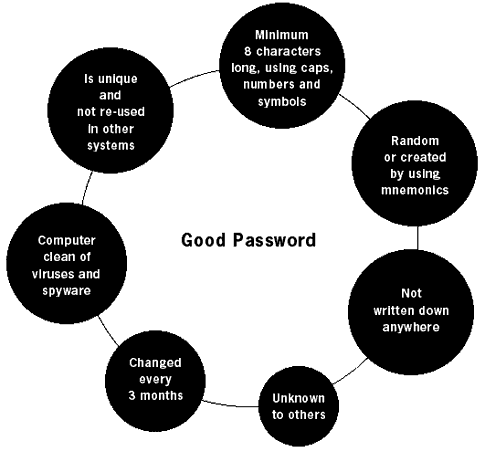Last year, one out of 13 people lost money due to internet
fraud and identity theft, says a recent report.
However, you can insure your password and data by following these easy-to-follow tips.
Always keep the cyber thieves guessing. Never use personal information to create a username, login or password. It could be the name of your pets, relatives, nicknames, dates of birth, etc.
Identity theft experts have become savvy at ferreting out these details. Hence, it is crucial to choose usernames and passwords that have nothing to do with your personal history.
Avoid using the same login and password across multiple sites and/or cards and accounts. If a thief gains access to one, it will be like a house of cards, allowing them to quickly wreak havoc across your entire financial portfolio.
Studies have consistently shown that a large fraction of all user-chosen passwords are readily guessed automatically. Shorter passwords are more susceptible to commercially available password recovery tools.
Such software is capable of testing 200,000 passwords per second. To improve the cipher strength of your password, longer passwords are better. Include a minimum of 8 characters -- using both upper and lower case letters and a mix of letters, numerals and symbols. Do not use words found in the English dictionary.
Put yourself into a thief's shoes -- don't even think about using an overly simplified password such as "12345678," "222222," "abcdefg."
Avoid sequential passwords or using passwords derived from the use of adjacent letters on your keyboard; this will not make your password secure. Also, avoid using only look-alike substitutions of numbers or symbols.
Criminals and other malicious users who know enough to try and crack your password will not be fooled by common look-alike replacements, such a
s replacing an 'i' with a '1' or an 'a' with '@' as in
"L@rgeSoftw@re" or "P@ssw0rd."
But these substitutions can be effective when combined with other measures, such as length, misspellings, or variations in case, to improve the strength of your password.
There are many decent applications on the market that will digitally safeguard your various passwords. Avoid using the free ones "built-in" to browsers as these have been widely exposed for their security flaws.
Consider software like Password Manager that memorises and securely stores each username and password that you enter on a website.
However, you can insure your password and data by following these easy-to-follow tips.
|
|
Always keep the cyber thieves guessing. Never use personal information to create a username, login or password. It could be the name of your pets, relatives, nicknames, dates of birth, etc.
Identity theft experts have become savvy at ferreting out these details. Hence, it is crucial to choose usernames and passwords that have nothing to do with your personal history.
Avoid using the same login and password across multiple sites and/or cards and accounts. If a thief gains access to one, it will be like a house of cards, allowing them to quickly wreak havoc across your entire financial portfolio.
Studies have consistently shown that a large fraction of all user-chosen passwords are readily guessed automatically. Shorter passwords are more susceptible to commercially available password recovery tools.
Such software is capable of testing 200,000 passwords per second. To improve the cipher strength of your password, longer passwords are better. Include a minimum of 8 characters -- using both upper and lower case letters and a mix of letters, numerals and symbols. Do not use words found in the English dictionary.
Put yourself into a thief's shoes -- don't even think about using an overly simplified password such as "12345678," "222222," "abcdefg."
Avoid sequential passwords or using passwords derived from the use of adjacent letters on your keyboard; this will not make your password secure. Also, avoid using only look-alike substitutions of numbers or symbols.
Criminals and other malicious users who know enough to try and crack your password will not be fooled by common look-alike replacements, such a
|
|
But these substitutions can be effective when combined with other measures, such as length, misspellings, or variations in case, to improve the strength of your password.
There are many decent applications on the market that will digitally safeguard your various passwords. Avoid using the free ones "built-in" to browsers as these have been widely exposed for their security flaws.
Consider software like Password Manager that memorises and securely stores each username and password that you enter on a website.

- Don't rely on Windows passwords to protect your information. They are easily broken.
- Create passwords which are 8 characters or longer (in a few years' time, we will be recommending 9!) You can also use a short sentence as your password.
- It is better to write down you passwords and keep them safe, than to have a short, easy to guess password18.
- Use numbers, small letters, capitals and symbols in your password.
- Never use the same password twice
- Do not use passwords which can be directly related or linked to your personal life or interests.
- Do not share or tell anyone your important passwords.
- Change your passwords every 3-6 months.
- Remember that there are many programs available free on the Internet, which will identify your Windows password, wireless network encryption and just about any other type of computer password you may have.
How to make your password safe
KAWAL YOUR TECH GURU - INFOTECH
Get the latest update for your P.C, Tips & Advice for better P.C, Safety Advices and Much much more.